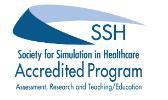Participation and consent
The SCSIL (or Center) utilizes Standardized Patients (SPs) and devices to teach and assess clinical and procedural skills and professional competencies. SPs are individuals from the community who are specially trained to simulate the signs and symptoms of an illness or clinical scenario and to assess performance of and provide feedback to learners. SPs who receive additional training in using their bodies in teaching, assessment and feedback on aspects of the physical examination may also have roles as Physical Teaching Associates and Genital Teaching Associates. Simulations, whether SP-related or utilizing devices, are difficult and time-consuming to develop; each is carefully selected and developed to meet specific educational objectives. SPs and SCSIL staff also evaluate professionalism of learners in the Center.
Participation at the Center is subject to the following terms and conditions:
Protected information: Health information acquired as part of any learning activity using standardized patients shall be treated with the same degree of confidentiality as patient information under the Health Insurance Portability and Accountability Act of 1996 (HIPAA). Discussion of SPs health information outside authorized Center activities is strictly prohibited.
Proprietary information: In order to protect the learning experience from being undermined by premature disclosure of information about a simulation, students are required to keep in confidence the nature of the simulation and specific information related to it including history and physical examination findings, laboratory test results, working diagnoses and final diagnoses. Any unauthorized reproduction of any simulation or sharing of information about simulations will be considered a breach of the EVMS Honor Code and will be subject to disciplinary action. If you have a question about what is appropriate to discuss, please ask a Center staff member.
Media recording: Digital recording (video and audio) of activities is an integral part of evaluating a student’s performance in the Center and is a requirement of the curriculum. Training activities that are recorded in the Center are available for later viewing by individuals with a legitimate educational interest, as defined by the Family Educational Rights and Privacy Act of 1974 (FERPA). This includes authorized Center personnel that manage and assure the quality, integrity and security of digital recordings and faculty responsible for program curricula. Digital recorded data will not be used for training, instructional purposes, in presentations/publications or other uses without your permission. Digital recordings are the property of EVMS and subject to the EVMS SCSIL Recordings Retention Policy.
Professionalism: No food or beverages are allowed in the Center. Cell phones, personal digital assistants (PDAs) or other electronic devices with recording capabilities may not be used in the Center. Noise shall be kept to a minimum and students must maintain the same professional behavior as they would in any healthcare environment. Unprofessional behavior will not be tolerated and will be subject to disciplinary action.
Other: Please note that breast, rectal and genital exams are not to be performed during any SP patient session or performance examinations unless students are directed to do so.



